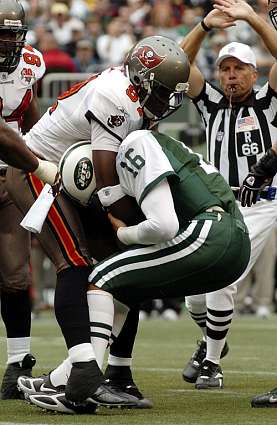|
|
 |
|
Loss less painful if Bucs realize error of ways
| |
|---|
|
|---|
|
|---|
 Gary Shelton, The St.Petersburg Times, published 10 October 2005
Gary Shelton, The St.Petersburg Times, published 10 October 2005
When an offense is going nowhere, a lot of things are able to catch up to it. Baffling interceptions, for one thing. And maddening penalties. And an overly conservative nature. When a game plan looks duller tha n the gray New Jersey sky, a team's shortcomings look clear. Over-reliance on one weapon, for example. And underuse of another. And a face from the past.
For the Tampa Bay Bucs, a lot of bills came due in Sunday afternoon's 14-12 loss to the New York Jets. This time, the Bucs had to pay for their familiar failings. Over the first month of the season, it was easy to overlook the team's problems. Yes, the line held a lot and, yes, the quarterback threw too many balls to the other team and, yes, the offense seemed to have forgotten all about Michael Clayton. Ah, but when a team is 4-0 and has become the talk of the league for its conquests, its karma and its Cadillac, who is going to pay attention?
Against the Jets, however, all of those old problems blended into quicksand and, because of them, the Bucs lost a winnable game. The point is not that the Bucs stubbed a toe for the first time; the point is that the apparent problems still exist, and if they remain uncorrected, other toes are in danger. The Bucs offense was awful. It could not score a touchdown. It converted only two of 14 third-down situations. It committed 12 penalties (running the total to 53 in five games). It scored less than 20 points for the fourth straight game. It lacked rhythm, it lacked danger and it lacked aggressiveness.
Consider this: In four trips inside the Jets 30-yard line, it ran 15 plays from scrimmage. Not one of them involved throwing to a receiver in the end zone. Which, as you might have heard, is where touchdowns are scored.
Nothing against kicker Matt Bryant, whose foot may be second only in importance to that of Carnell Williams on this team, but occasionally, a team on the road is going to do better than field goals. Every now and then, a quarterback is going to have to attack a defense instead of waiting around for a password. Yet, the Bucs did not. All afternoon, Brian Griese threw short of the first-down markers, short of the goal line and, sometimes, short of the receiver.
For instance, with 4:50 to play in the game, the Bucs faced a third and 10 on the Jets 18, trailing 14-9. Griese dropped back and threw quickly to Ike Hilliard ... for 6 yards. That brought on yet another fourth and Bryant. "We thought we would throw to Ike, and maybe he would get 6 yards," Griese said. "Maybe he could get 2 more yards, and we would be in a fourth and (short) and in a situation where we could go for it."
Oh. Considering the Jets were 12th in the league in defense coming in, it might have been overly respectful of him not to force the issue. To be fair, it is possible several things were going on once the Bucs entered the red zone. One, the offensive line was struggling against the Jets' rush, and a sack or a penalty could have taken the Bucs out of field-goal range. Two, Griese has thrown a few out of the strike zone this season.
It was another tough day for Griese, whose interception set up the Jets' first touchdown. He also threw two more interceptions that were negated by penalties. If you had to guess which quarterback was fighting age and rust, you might have been hard-pressed to pick between the current Buc and Vinny Testaverde, the old one. Also, if the Bucs had been 1-3 coming in instead of 4-0, you might have looked at the sideline to see if Chris Simms was warming up.
As Gruden said, however, "we have to play better around our quarterback." And that's true, too. The game was barely 10 minutes old before Griese was sacked for the third time. Five times during the game, a Bucs lineman was called for a penalty on first down. On only one of those series did the Bucs overcome the penalty with another first down.
For two weeks now, the Bucs have looked like a team that has too much reliance on Williams and not enough on Clayton. In Williams' case, that's easy to figure; in Clayton's, it's a mystery. The Bucs spent most of Sunday acting as if both had been deactivated for the game instead of just Williams. Clayton played, but not so you would notice. He might as well have been covered in bubble wrap for all the Bucs used him.
Clayton says he is 100 percent, although when he says it, he doesn't sound convincing. Gruden says Clayton is hurt and "clearly not himself." Either way, Clayton has been too small of a factor this season. Ask yourself: Of those 15 plays the Bucs ran inside the Jets 30, wouldn't you have loved to have seen Clayton with a chance to make a play in the end zone? Or anyone else, for that matter?
Of course, in the NFL, random defeat doesn't carry a lot of meaning. It isn't the loss that should concern Gruden; it's the serial shortcomings that have not been repaired. The turnovers. The penalties. The attack that nibbles rather than devours. Eventually, those sort of things get in the way of the scoreboard.
|

|
|
| |
| |
|